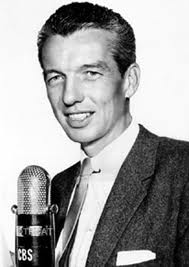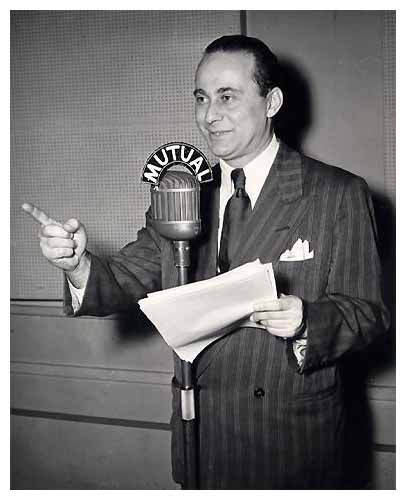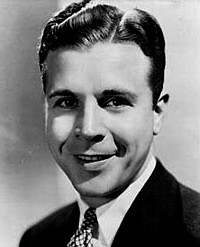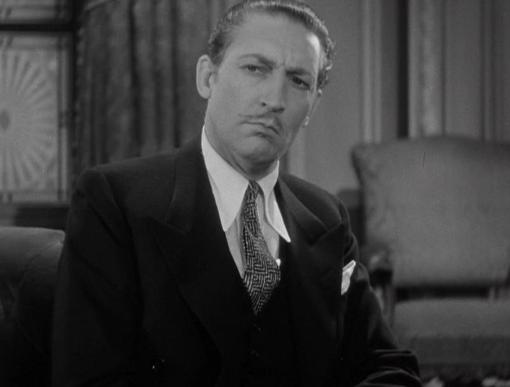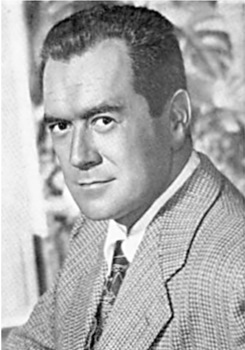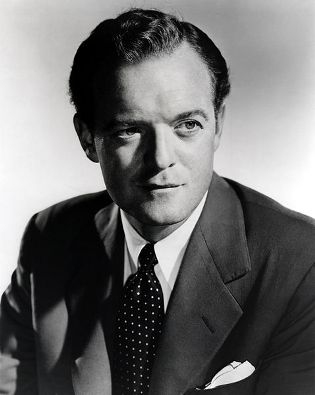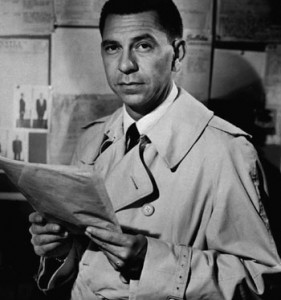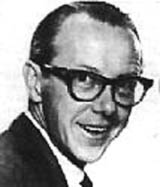In Parts One, Two, and Three of my series on the Greatest American Radio Detective performances, I laid out the ten best performances, but are there other great performances worthy of consideration? Sure. Here we take a look at some honorable mentions in no particular order:
Jack Webb as Joe Friday in Dragnet:
It was certainly one of the most iconic post-war performances taken together as a whole in radio and television. The narration, the sardonic one liners, were the stuff of Joe Friday on radio. The reason he doesn’t make the list is simple. Most everyone on the list had to carry most of the weight of the show’s success. On Dragnet, Friday was important in that regards but not pivotal. His partners provided comic relief. For whole stretches of most episodes, his dialogue was limited to asking simple questions. In television, even when he wasn’t talking, Friday’s facial expressions told something. However, when someone else is talking on the radio, he’s just sitting there.
Now, Dragnet is a better show than most that are on this list, but the performance of Jack Webb the actor has less to do with that than Jack Webb the Director, Producer, and Creator.
Jack Smart as Brad Runyon in The Fat Man, 1946-51
Smart played another one of the golden age of radio’s iconic figures, the Fat Man, an overweight detective who was one of radio’s first hard-boiled private eyes. The character was created by Dashiell Hammett based on his Continental Op character, but ultimately it was Smart who gave him life as a tough, street-smart detective with a soft spot for people in trouble.
The Fat Man was hugely successful. It had high ratings, was one of the few detective radio programs to spawn a movie, and everyone who heard the program remembers it fondly and distinctly. The series also points out to the challenge of making a list like this: It’s based on surviving episodes.
Out of approximately two hundred and eighty-nine episodes, there are only ten episodes from Smart’s run as the Fat Man in circulation. They’re all very good, but based upon what I heard, I was more impressed by everyone who made the list. But what if I had a greater sample of Smart’s work? Let’s say seventy-two episodes. If those were exceptionally good, would that change the list?
Every detective show on the list (other than Harry Nile) have lost episodes and many have significant numbers of episodes missing. What if we had more runs of Barrie Craig, the Saint, or Candy Matson? What if we had more of Basil Rathbone’s Sherlock Holmes? Most of his circulating episodes come from his last season and a half where he was feeling burnout with the role. All these could change our perceptions, but we can only go by what we can hear. So we just do the best we can. Still, I think it’s important to acknowledge the issue.
Smart’s performance as the Fat Man may have been far better than the good performance we had, but it’s also possible what makes the show so memorable to those who first heard it is the opening, which doesn’t have Smart doing anything.
Alan Ladd as Dan Holiday in Box Thirteen (1947-48):
A radio show that Ladd created for radio. It not only served to provide him and his family additional income in resyndication, it helped to promote him as an actor. He burst onto the scene with This Gun for Hire where he played a hired killer. The big risk of such a role is getting typecast as playing these sort of tough guy underworld roles.
Box Thirteen helped in showing Ladd’s range. Yes, he could do action and daring, but he could also be smart, compassionate, and even recited a poem in one episode. Ladd’s voice on radio is smooth and he’s fun to listen to. He always benefited from great scripts but his performance made the series memorable and it showed all the world what Alan Ladd was capable of.
Frank Lovejoy as Randy Stone in Night Beat, 1950-53:
Lovejoy had some solid roles in movies, TV, and film, but the role of Randy Stone is the one he was born for. Stone is an interesting character who traverses the Night Beat, solving mysteries, and helping other people in their lives. He brims over with ideals, but also has a cynical streak. He’s often in humorous situations but can unleash righteous fury on those he thinks are acting unjustly. While he’s well known in the streets of Chicago, his job and the nature of working nights has left him with few close friends.
A big part of what makes Night Beat such a delight to listen to is the way Lovejoy fleshes out Stone with all of his wonderful contrasting and occasionally contradictory characteristics. It’s really the key to help us to connect with the unusual stories Stone finds while working the Night Beat.
Gale Gordon as Gregory Hood in The Casebook of Gregory Hood, 1946:
For those who grew up on television, Gale Gordon was known for playing a series of loud-mouthed authority figures: Mr. Conklin in Our Miss Brooks, John Wilson on Dennis the Menace, and Lucille Ball’s boss in The Lucy Show and Here’s Lucy. This goes even further back, to Mayor Latrivia in Fibber McGee and Molly. Then you have the Casebook of Gregory Hood where he plays Gregory Hood, a smooth, sophisticated antiques dealer who occasionally plays amateur detective.
Gordon is good and convincing in the role and it’s a shame he left the series after sixteen episodes. While Elliott Lewis was a solid replacement, he didn’t quite have that same style and finesse that Gordon had. While Gordon would go to comedy gold in basically similar roles for the rest of his career, the surviving episodes of this series point out what a good and versatile actor he really was.
There are many performances we could mention. There were many good performances on detective programs in the golden age of radio. The top ten were the best, and these were just a notch below that.
This post contains affiliate links, which means that items purchased from these links may result in a commission being paid to the author of this post at no extra cost to the purchaser.
If you enjoyed this post, you can have new posts about detective stories and the golden age of radio and television delivered automatically to your kindle.
